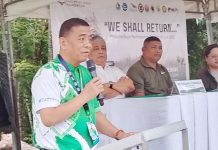TACLOBAN CITY- There’s nothing wrong with the use of drop boxes in reporting village drug dependents.
Thus said the regional director of the Commission on Human Rights(CHR), lawyer Desiree Pontejos who was quick to say that the mechanism would only violate one’s human rights if names of suspected drug users would be openly announced in the media.
Pontejos said that the use of drop boxes has acquired the system of ‘confidentiality.’ Thus, it could not be considered as violative of one’s human rights.
“We can only consider it as a violation of one’s rights if this will be broadcast or publish. Since this will be coursed through the use of a drop box, there is confidentiality in it,” Pontejos said.
The city office of the Department of Interior and Local Government, through its chief, lawyer Darwin Bibar, had earlier said that drop boxes would serve as one of the mechanisms on the campaign of the national government against proliferation of illegal drugs as well as abuses and corruptions committed by barangay leaders.
Bibar also said that information they obtained from the drop boxes, to be placed in the barangay halls, would still be subjected to verification with the help from the city police and the Philippine Drug Enforcement Agency if the issue falls on illegal drugs and the Office of the Ombudsman if the matter has something to do with corruption.
He said that through their verification process, any possible abuse could be check.
“All things are susceptible to abuse. But this process is just a verification; it’s just an information. For it to stand a legal leg, there should be an affidavit,”Pontejos said.
But for Bayan-Sinirangan Bisaya, this drop box method is just another form of “intensifying the hysteria over local communities.”
“(This will) prompt a violent and misplaced persecution of the urban poor instead of attacking the root causes of drug proliferation: poverty itself,” said its spokesperson Joshua Sagdullas.
(JOEY A. GABIETA)



